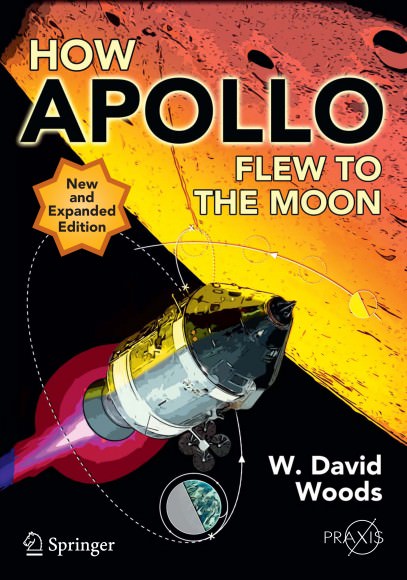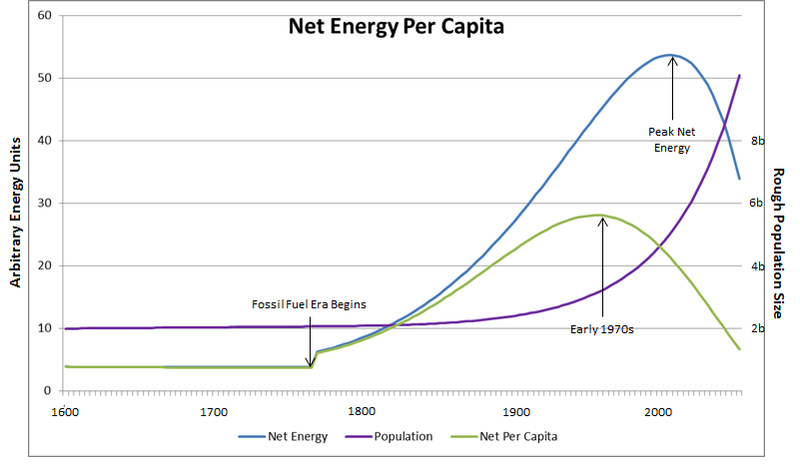
I’m an electrical engineer that specialized in operating system design. I built my first computer in 1981 before the IBM PC was available. I designed an integrated circuit in 1983 for my Masters thesis. I managed large R&D groups for most of my 25 year career. I continue to be a technology geek in my personal life. As a consequence, I have a pretty good sense of what is impressive, and what is not, from an engineering perspective.
As readers probably know, I think net energy constraints have placed us at, or passed, the peak of all forms of complexity, including technology. I see evidence everywhere of peak technology.
The highlights of human engineering accomplishments for me include: steel, concrete, glass, Haber-Bosch fertilizer, diesel engines, turbine engines, turbine electricity generators, electric motors, electromagnetic communications, hydraulics, heat pumps, Panama canal, Golden Gate bridge, Chunnel, Concorde, Apollo, Hubble, Voyager, nuclear submarines, skyscrapers, deep-sea oil rigs, integrated circuits, microprocessors, magnetic storage, lasers, LED lights, internet, lithium-ion batteries, robotics, and DNA sequencing.
Notice that everything on this list is over 20 years old. I can’t think of anything of equal importance that was invented in the last 20 years.
Gasoline and turbine engine efficiency gains have stalled. Diesel engine efficiency is going backwards due to new pollution regulations. Air travel speed plateaued many years ago. The promise of too cheap to meter nuclear electricity appears certain to remain a dream. Battery performance barely creeps forward despite a hundred years of promises. My 3 year old smart phone works fine with no compelling reason to upgrade. Cameras were good enough many years ago. Household appliances are getting smarter, but their core functions are not improving, and they don’t last as long due to cost reduction pressures. TV resolution is increasing but few need it. LED lights are getting cheaper, but the technology was invented many years ago. Popular Mechanics magazine no longer writes about jet packs and flying cars.
It’s been 6 years since I built my current desktop computer. There’s still no compelling reason to upgrade it. If I spend the thousand dollars required to upgrade it, I will gain 25% performance. That’s nothing compared to the gains we saw 20 years ago.
I can see how a non-engineer might think otherwise. A computer in your pocket with a wireless connection to the internet feels like magic, but advances in the technologies used to build smart phones began to level off years ago. It’s not advances in fundamental technology that’s creating today’s magic. It’s thousands of small innovative apps, plus a few monster apps that leverage a 25 year old internet to connect us with friends and businesses, that creates the illusion of magic. Apps are software, and software is not new. There’s just a lot more software variety available to supply a much larger market created by everyone having a networked computer camera in their pocket.
For a long time I’ve felt our most impressive technology accomplishment occurred 50 years ago when we visited the moon. I vividly remember as an 11 year boy going outside at night and looking up in awe at Armstrong on the moon.
Over the years I’ve read and watched much about the Apollo program but never encountered anything that got into the details of Apollo’s engineering. I intuitively suspected there was a lot of impressive technology depth to Apollo, but never had the facts to back up my intuition.
I’ve just finished the book How Apollo Flew to the Moon by W. David Woods and now I have the facts to confirm my intuition. The book covers all of the technical details for every phase of the mission from launch to splashdown. I love the clear, concise, and engaging writing style of the author.
What those 400,000 people 50 years ago accomplished over 10 years is breath-taking. Every step of the mission involved staggering engineering challenges and trade-offs. Lives were at stake on prime time television. The scale is hard to fathom. For example, the power produced by the Saturn V first stage was equivalent to the entire electricity consumption of the UK. More recent engineering accomplishments are not even in the same league.
Wood’s book answered all of my questions plus many I had not thought of:
- how did the engines work?
- how did they navigate?
- how did they steer?
- how did the stages separate?
- how do you move from an earth orbit to a lunar orbit and back?
- how did the lunar module land?
- how did the lunar module take off, find, and rendezvous with the command module?
- how did mission control track location and monitor systems?
- what did the computers do?
- what were the emergency contingency plans?
If you prefer to listen than read, here are some excellent podcasts with W. David Woods discussing the Apollo program:
Omega Tau 083 – How Apollo Flew to the Moon (December 15, 2011)
Omega Tau 097 – How Apollo Explored the Moon (June 18, 2012)
Omega Tau 176 – The Gemini Programme (July 18, 2015)
Omega Tau 239 – The Saturn V Launch Vehicle (March 12, 2017)
If you prefer to watch than read, here is a video presentation by W. David Woods in which the production quality is mediocre, but the content is strong.
If you are wondering why we have not accomplished anything even close to the Apollo program in the intervening 50 years, it’s because per capita net energy peaked around 1970, and has been declining ever since. In other words, our most complex achievement coincided with the peak of per capita net energy, as students of thermodynamics should expect.
I predict that the Apollo program will remain in perpetuity the most impressive achievement of the human species.

I suspect you can make the same argument about culture.
Both Led Zeppelin and The Beatles coincided with Apollo.
It’s been downhill all the way to Justin Timberlake.
LikeLiked by 3 people
Wow, Rob, I love this post, and fully agree with you.
If you’ve not already read John Michael Greer’s 2011 post “An Elegy For the Age of Space”, you’re in for a treat:
http://archdruidmirror.blogspot.com/2017/06/an-elegy-for-age-of-space.html
https://www.countercurrents.org/greer250811.htm
Keep up the great writing and posting!
~ Michael
LikeLiked by 1 person
Thanks Michael.
Greer has a great mind and insights but I stopped reading him because for my taste he needs an editor to remove 4 out of 5 words from everything he writes. I’m an engineer that likes ideas expressed in the fewest words possible. Greer’s also a major practitioner of woo woo which makes me squirm no matter how sound his ideas seem.
LikeLiked by 1 person
I agree. Even though at the time I was in quite another world:
https://web.facebook.com/david.chandler.9026/posts/10156402023973103
LikeLike
Thanks Rob.
I agree with you more or less. I’m not interested in pissing contests, but many will argue endlessly over the details. I have seen others make the case that eradicating Small Pox was humankind’s greatest achievement and it was even bigger and lengthier and also was an international cooperative effort. We, the taxpayers of the member states helped pay for it too, so take a little bow everyone. Eradicating Small Pox has probably helped along population expansion, but it prevented untold human suffering in the here and now.
We certainly got plenty of nifty technology spin offs from the space race and like most technology, it’s a two sided coin. I just accept that humans will attempt to build and accomplish anything they can think up because humans cannot help but reward seek. All our behaviours and drives are evolutionary. Not much choice.
ONWARD HO
Neuroscience confirms that to be truly happy, you will always need something more
“The innate human desire to seek means that we can never truly feel that every desire and wish has been met. There will never be an end to the to-do list, future goals and plans, the things we want to achieve and see. ”
https://qz.com/684940/neuroscience-confirms-that-to-be-truly-happy-you-will-always-need-something-more/
LikeLike
You’re right. I was looking through the exclusive lens of engineering.
I suppose antibiotics and surgery are also up there as technical achievements but I don’t consider them engineering. Ditto on the science of physics and biology.
Some might argue, but not me, that great literature, art, and music might also qualify.
LikeLike
I’m a mechanical engineer and totally agree with you! Technology is not increasing. I’m sure the net energy issue is part of it, but there is also the related issue that technology experiences diminishing marginal returns. This contradicts most people’s thinking in that so many assumed some kind of exponential increase of technology. Unfortunately this is childish fantasy – or techno narcissism. The reality is that there is a finite potential for technology, and our early fossil fuel efforts got the low hanging fruit.
Joseph Tainter has some excellent research on this subject where he reviews patents, #’s of researcher per patent, etc. Some of his work references philosopher Nicholoas Rescher, Chairman of the Center for the Philosophy of Science, University of Pittsburgh. Tainter has cited a few things from him before:
We need exponential increases in research expenditure to maintain a constant rate of innovation
Innovation reaches diminishing returns
In natural science, we are involved in a technological arms race and with every ‘victory over nature’ the difficulty of achieving the breakthroughs which lie ahead is increased
Rescher has a 1978 book called Scientific Progress: A Philosophical Essay on the Economics of Research in Natural Science.
LikeLike
You’re right. Diminishing marginal returns of technology is also a major factor. Net energy influenced the timing of Apollo because it was a very expensive program for a country to undertake.
I’ve read Tainter’s book and thought it was very good.
At the beginning of my career, a couple people could invent a useful new computer product, and have it on the market in a couple years. Not anymore. It now takes dozens of people much longer unless you’re writing an app, and then its likely someone else has already written a competing app.
LikeLike
While Apollo was great, probably the pinnacle as you say – the current generation of CPUs are kind of a miracle. How small everything is and the thousands of people they take to come together to get things working and manufacturable – don’t undersell them.
LikeLike
Here is a fascinating interview by Markus Voelter of Lex Augusteijn on how engineers have increased the speed of our computers. Computers are central to every advancement our culture values, and they’re also a fascinating case study of how injecting energy (wealth) into a system increases its complexity.
http://omegataupodcast.net/300-how-processors-got-so-fast/
LikeLiked by 1 person
Are we entering the age of involuntary degrowth? Prometheantechnologies and declining returns of innovation
https://www.scribd.com/document/378522933/Are-we-entering-the-age-of-involuntary-degrowth-Promethean-technologies-and-declining-returns-of-innovation-Bonaiuti-2017
LikeLiked by 1 person
Antonio Turiel explains why 1972 will remain in perpetuity the last time humans escape the earth’s gravitational field.
http://crashoil.blogspot.com/2019/07/cincuenta-anos-del-primer-hombre-en-la.html
LikeLike
Ugo Bardi explains that if you plot the number of manned space flights per year it has a similar shape to Hubbert’s curve which describes peak oil.
When the oil’s gone, most of our technology, and most of our wealth, and most of our population will also be gone.
The real reason why we didn’t go back to the Moon: The decline of spaceflight
https://cassandralegacy.blogspot.com/2019/07/the-real-reasons-why-we-didnt-go-back.html
LikeLike
An amazing site that lets you experience entire Apollo missions in real time…
https://apolloinrealtime.org
LikeLike
Do they finally reveal the location of the secret sound stage where all duh hoaxin was filmed?
LikeLike
🙂
LikeLike
This is a really good article Rob. Nice to read some of the archives from the site 🙂
LikeLiked by 1 person